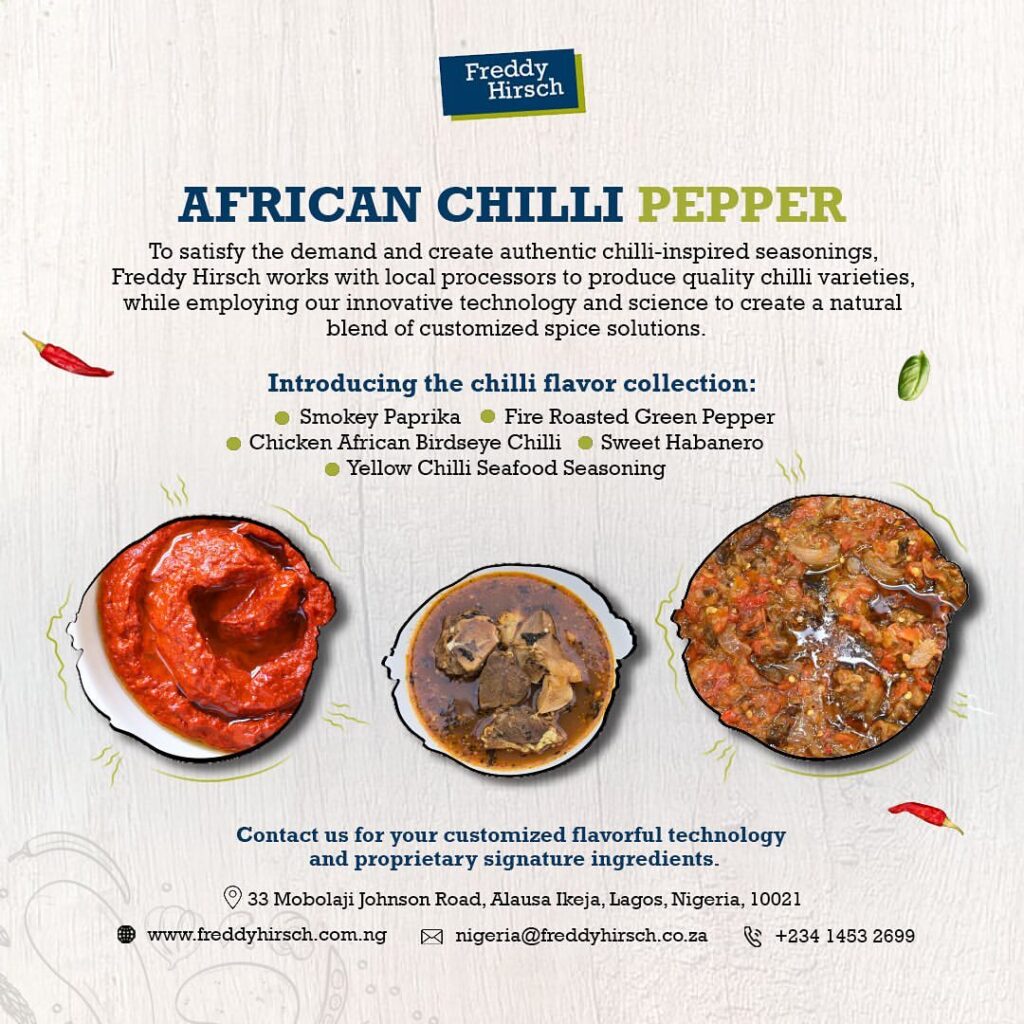A quarter of the world’s population eats chillies every day, say scientists that have been studying wild chilli peppers. Chilli pepper is loved globally because its core ingredient, Capsaicin (also found in pepper spray) triggers a rush of stress hormones, relieves pain, makes food safer, and can even help people lose weight.
Chilli pepper (also called hot pepper) came to Africa with Portuguese colonizers in the 16th century and quickly made itself indispensable in many areas of African cooking. In many West African countries, chilli pepper is a must in every recipe.
Chilli Pepper plays an important role in the food industry today. It impacts a distinct and pleasant taste while enhancing the flavor-heat, pungency, warmth, and color of prepared delicacies. As regional cuisines have become more globalized consumer preference for foods that incorporate bold and spicy flavors has increased significantly. Research shows that consumers are more likely to try spicy variations of savory food and this is becoming more popular as the hot and spicy food segment continues to grow.
Apart from its satisfying consumer’s craving for hot and spicy food, it is another superfood, especially nutritious when ripe and red (unripe chillies are green or yellow). They are rich in Vitamins A, B, and C and do all kinds of good things for the body such as fighting inflammation (the hotter the chilli, the better), arthritis and pain and directly on the skin against psoriasis, clears mucus congestion, and wonderful for the heart and cardiovascular health as it’s full of antioxidants.
After researchers at the Chinese Academy of Medical Sciences in Beijing tracked half a million adults in China for seven years, they discovered that people with spicy diets tend to live longer, and people who regularly ate fresh chil’ies, in particular, were less likely to die of cancer or heart disease.
Its application across the region is a good representation of how much Africans have embraced the chilli pepper. In Tunisia, it is the Harissa sauce, a red hot chilli sauce with olive oil, lemon, caraway, and coriander; Ghana’s variant is the Shito sauce, a hot pepper sauce prepared with dried fish, prawns, onions, chilli, garlic, some spices and perfected with umami from shrimp and anchovies. Nigeria’s red chilli pepper is a dominant ingredient in its famed pepper soups, a peppery broth made with chicken or goat with a combination of spices. The chilli pepper is also found in South Africa’s Peri-Peri sauce made with African Bird’s Eye chillies, Nigeria’s Ofada sauce (an accompaniment for the local Ofada rice), and Ewa Aganyin sauce which uses Cameroon pepper.
In West Africa, where most people love spicy food, there is a rich array of unique chilli peppers in abundance from local/natural sources meeting the culinary and nutritional needs of consumers.
Specific chilli available in this sub-region are African peri-peri (Bird’s Eye chilli), Paprika (locally called Tatashe), Habenero (red, yellow, greens), Cayenne pepper (Shombo chili), Cameroon pepper, and Alligator pepper-a peppery flavor with floral aroma with hints of jasmine, cardamom, and clove. Each of these has its unique flavor, color, aroma, and pungency presented in local delicacies. People of African heritage believe that chillis educate the spirit, intoxicate the sweat glands and sharpen the senses.
In this edition, we feature the African Chilli Pepper flavors and their role as a versatile spice with hyperlocal
applications across Africa. To create authentic chilli-inspired seasonings, we work with local processors to produce quality chilli varieties, which combined with our innovative technology, create new customized spice solutions tailored to African taste. We are proud to introduce our unique Chilli flavor collection: Smokey Paprika seasoning; Fire Roasted Green Pepper seasoning; Chicken African Birdseye chilli; Sweet Habanero, and Yellow Chilli Seafood seasoning.
As you fire up your year with our chilli spices, we would like to welcome you to the ninth edition of our ‘A Taste of Africa’ newsletter.
Happy new year!
Kojo Brifo
Managing Director, Freddy Hirsch Nigeria
The Flavor of the month
Our flavor for the month is the African Chilli Pepper, a source of rich spicy goodness and a must-have in every kitchen in West Africa.
Chilli Pepper plays an important role in the food and spice industry today. A quarter of the world’s population eats chilli daily because chilli impacts a distinct and pleasant taste while enhancing the flavor-heat, pungency, warmth, and color of prepared delicacies. Its application across the region is a good representation of how much Africans have embraced the chilli pepper.
Find out more about our African Chilli Pepper flavors here

Source African flavors based on authentic insights
Freddy Hirsch has invested in a state-of-the-art manufacturing plant, Research, Development, and Application laboratory and extensive networks that enable it to derive authentic insights from customers, meet their unique taste preferences of the regional market and develop competitive solutions in culinary, bakery, confectionery, and dairy.
We also offer our customers Naira trading and predictable OPEX, speed to market, due to local sourcing, non-FX issues, and shorter lead times, among others.
Find out more about our Value Proposition here

Freddy Hirsch in the news
In this edition, we are throwing it back to our announcement with Symrise AG, which spotlights our partnership to boost food innovation and nutrition in West Africa. Please see a quick summary here.
